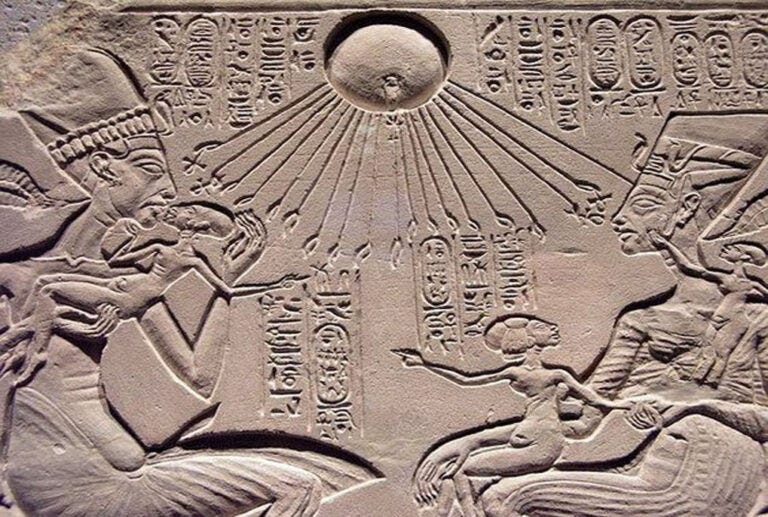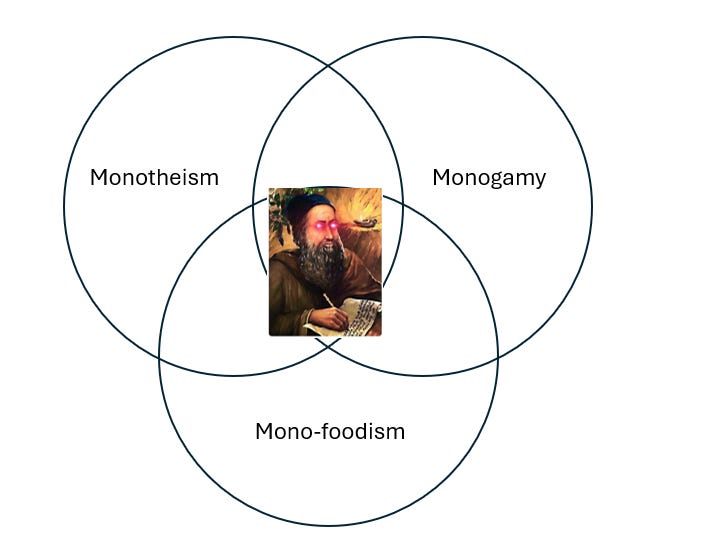God & Wife
Are Monogamy and Monotheism driven by the same impulse?
Centuries before Abraham, an Egyptian Pharaoh cast out all the gods in favour of one true God. Here is Will Durant in his final book Heroes of History on the strange monotheistic king of Egypt:
Amenhotep IV was hardly designed to be a king: he cared more for art than for war, wrote the most famous poem in Egyptian literature, and indefatigably loved his wife, Nefertiti. He allowed artists to show him riding in a chariot with the queen, engaged with her in pleasantries with their children.
On ceremonial occasions Nefertiti sat beside him and held his hand, while their daughters frolicked at the foot of the throne. She gave him seven daughters, but no son; he still loved her and took no secondary wife. He spoke of her as 'Mistress of my happiness, at hearing whose voice the King rejoices'; and for an oath he used the phrase 'As my heart is happy in the Queen and her children.'
Next to her he loved the sun. The Egyptians had long worshiped it as the father of all earthly life; but they had also worshiped Amon and a hundred other gods, from the evening star to the onion and the baboon. He was revolted when he saw the high priest of Amon sacrifice a ram to the god; he scorned the traffic of the clergy in magic charms and their use of the pretended oracle of Amon to support their plans.
He abominated the indecent wealth of the temples and the growing hold of a mercenary hierarchy on the nation's life. With a poet's audacity he threw compromise to the winds and announced that these deities and ceremonies were a vulgar idolatry and that there was only one god, Aton — the sun. He threw off his inherited name of Amenhotep, which contained the word Amon, and called himself Ikhnaton, meaning 'Aton is satisfied.'
Helping himself with some monotheistic poems composed in the preceding reign, he wrote passionate songs to Aton, the god-sun; the longest of these now surviving is the most remarkable remnant of ancient Egyptian poetry: Thy dawning is beautiful in the horizon of the sky.
This passionate poem to Aton ends in an intertwined ode to his beloved wife:
Thou didst establish the world,
And raised them up for thy son. . . .
Ikhnaton, whose life is long;
And for the chief royal wife, his beloved,
Mistress of the Two Lands, Nefer-nefru-aton, Nefretiti,
Living and flourishing for ever and ever.
Durant on the poem:
This is not only one of the great poems of history, it is the outstanding expression of monotheism 640 years before Isaiah. Ikhnaton's god is not tribal, like Jehovah; Aton feeds and rules all the nations of the earth. It is a vitalistic conception of deity, as a creative living power animating all things; its heat is the warmth of life and the ardor of love; it nourishes and fertilizes every plant, energizes every animal, and 'creates the man-child in woman.'
It is a god for all nations, for all forms of growth.
A poet king, bequeathed with daughters, untempted by war and singularly and loyally in love with his wife in an age of polygamy, discovers one true universal god and casts the rest into the flames. He writes a great love poem to his One God, interlaced with love for his One Wife.
Is all the Oneness a coincidence?
Amenhotep IV’s story echoes Abraham’s — preceding it by centuries — who also cast out the idols from his home following a revelation from God. Abraham’s God, like Amenhotep IV’s, creates and animates the universe. They are nourishing to all things. They are jealous Gods — thou shalt have no other gods but me. His Wrath mirrors a wife’s, demanding that every past connection, every visible reminder of a former lover be discarded, vanquished forever like idols.
The covenant made between God and Abraham is sealed by his circumcision. This covenant is evoked symbolically in the Jewish marriage ceremony in the ring the groom gives his bride. On Shabbat Jews sing the beautiful 16th century poem Lecha Dodi. In the poem, Shabbat is welcomed like a bride, and later in the poem, God is the groom and we are his bride.1 In Jeremiah too:
Thus says the Lord, “I remember the devotion of your youth, your love as a bride, how you followed me in the wilderness, in a land not sown.
Christianity takes this further. Nuns are brides of Christ. Catherine of Siena wore Christ’s foreskin, wet with blood, as a wedding ring. And in Christianity monogamy ultimately found its most effective vehicle, leading to the largely monogamous world in which we find ourselves today.
Monogamy and monotheism are both absolutist: a society with only some polytheism and some polygamy is simply polytheistic or polygamist (as I explain here).
The timing doesn’t quite work. Judaism was monotheistic from conception, but was polygamous for longer than it’s been monogamous. Rabbeinu Gershom issued an edict banning polygamy only a thousand years ago. And one suspects it was essentially theological cover for a practice that had already become frowned upon in a Christian world that was enforcing monogamy.
And yet… the impulse looks familiar enough, and history and culture is messy. I haven’t found anyone doing a more systematic investigation (please comment if you have).
So how did it end for our besotted Pharaoh, monotheistic pioneer? Badly. He was thirty when he died, abandoned by almost all but his wife and children.
Confident of his new religion, he ordered that the names of all gods but Aton should be carved or blotted out from every public place in Egypt. He cut out from his father's name the word Amon, as being a deity now dead; he declared all creeds illegal but his own.
The official hierarchy fumed and plotted; the people, seeing Ikhnaton's monotheism as a wholesale slaughter of the gods, muttered and rebelled.
The words Aton and Ikhnaton were effaced from all the monuments, the priests forbade the name of the heretic king to pass any man's lips, and the people referred to him as 'the Great Criminal.' The names that Ikhnaton had removed were recarved upon the monuments, and the feast days that he had abolished were renewed. Everything was as before.
Mono-foodism
If you’ve read this far, indulge me a little further. Mono-foodism.
Lust and gluttony are Christian sins. Perhaps like promiscuity diluted civilisation-building energy until it was finally harnessed in monogamy, so gluttony is a sign of decadence. Like promiscuity distracts from civilisation-building, perhaps so does gluttony.
Anglos conquered half the world with miserable isle food and some lemons and sauerkraut to ride them across the oceans.
Mongols conquered half the world riding atop strips of meat hardening under the saddle.
Jews can by design eat only a sliver of available foods. They have forsaken the sword in favour of study and trade. (The most prolific Jewish sects even wear the same clothes — one less distraction from their mission?) Maybe there is something in that ascetism that trades one thing for another. Maybe one cannot be good at all things. The Jews chose the mind and trade over food and sports. (This does break down with the British who basically invented sport and were a global trading powerhouse and an intellectual wellspring. I’m spitballing here!)
Or perhaps it is not that civilisations with monotonous food conquer nations but nations with large armies do, and large armies live on army rations which are monotonous. Perhaps the more a society’s food asymptotes towards army rations the closer it comes to domination. But that leaves out the Jews, who are not known for their armies.
However inchoate and potentially (?) flimsy, I am too enchanted by the elegance of sexual, theistic and culinary singularity alignment as civilisation building to let it go. Further investigation is required!
Your God will rejoice concerning you, (ישיש עליך אלהיך)
As a groom rejoices over a bride. (כמשוש חתן על כלה)





I enjoyed it you are are an excellent writer.
I have often speculated that Moses (who was an Egyptian prince with and Egyptian name) was actually an underground follower of Aton's religion and led a group of followers/slaves out of Egypt who became the original Hebrews. My own personal problems with Judaism is that orthodoxy is way too legalistic for my tastes (at my 100 year old grandmother's funeral we couldn't say the Kaddish because there weren't 10 men there) while Reform Judaism has always struck me as being bogus.
This was fun. Thinking can be a sport.
For some reason it reminded me of this old blog post of mine. https://amba12.com/2021/01/08/a-sweeping-vision/